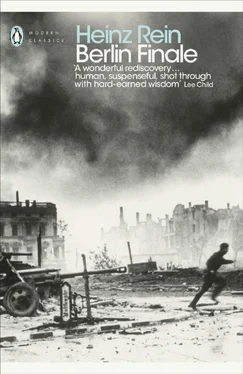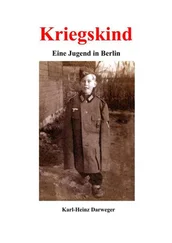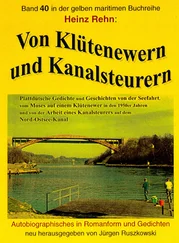When the German Army advanced as far as Moscow, the whole of Europe seemed to have been brought low and Great Britain was seen as a remote island destined for oblivion, then even the last doubters joined in, then the crowd of the just had hopelessly turned into the minority. The great mass of the people stuck with the victors, a gigantic propaganda machine using all the means of lying and mass psychology had left them numbed and immune to outside influences, by making common cause with a criminal gang they had become chained to it for good or ill, chained to it so tightly that its fall must become their fall, retaliation against one was retaliation against both, so that all decisions taken against them were seen not as decisions but as side-effects or the result of the fortunes of war, and finally, when the setbacks started coming thick and fast, they were seen as inescapable fate. For that reason those people also endured all the setbacks which began with the winter battle outside Moscow, continued via Stalingrad, El Alamein and the elimination of the U-Boat force, culminated in the landings in Italy and France, the loss of the Romanian oilfields and the advances on Warsaw, Aachen and Budapest, and finally led to the Elbe and the Oder and to massive daily air raids on the Reich.
That is the situation of these April days. Even though all predictions have been proved false, hopes repeatedly dashed in spite of all reassurances to the contrary, even though the material superiority of the enemy is in fact all too apparent to be ignored, and their strategy is putting ever-greater pressure on the Reich with deadly certainty, the great mass of the people still refuse to believe in defeat and downfall. Every optimistic word from Goebbels in the Reich , every rumour inspired from above and whispered with significant expressions is greedily received, even now when, at the terminus points of the suburban railways in Erkner, Strausberg and Königs Wusterhausen, with a half-way decent wind they can hear the thunder of cannon at the eastern front. What is this almost grotesque faith based on? Is it only rooted in fear of Bolshevism and the Western democracies?
Again and again Lassehn studies the faces around him, but he can read nothing in them, the faces are not only hard, they are frozen.
In Charlottenburg Lassehn leaves the S-Bahn. The station is nothing but a wreck, the roof is covered over and the twisted joists stretch into the air, the structures of the platforms are shattered, the waiting rooms burnt out and destroyed, the whole enterprise is a makeshift operation, and around the station stands a horrific backdrop of ruined houses.
Lassehn crosses Stuttgarter Platz, from which all life seems to have fled, and walks dazedly into Kaiser-Friedrich-Strasse. Scruffy children, squealing wildly, climb over the piles of rubble and into the bomb craters, as nimble as mountain goats on broken walls and barricades, familiar with the colours of the dead city, charcoal-black, rust-red, heedless of the fact that tears and blood, curses and prayers hang over these fields of ruins. War, which once we brought to foreign lands, he thinks, has returned to us like a boomerang and retaliated, it is making us pay for Warsaw, Rotterdam and Coventry. The terrible logic of a vengeful justice!
Then he stops in front of a house. Was this not where his wife lived? The white sign with the number has been hit by a ricochet and is now indecipherable, and the houses nearby have been destroyed. Lassehn is still unsure. Was there a bookshop in the building? He can’t remember, he only lived here for a week, after all, at last he decides to go in. When he tries to open the door and puts his hand on the handle, it is pushed back up from inside and thrown violently open. Lassehn quickly steps back.
A lady comes out of the door, she gives Lassehn a fleeting glance and mumbles an apology, then she walks past him. Lassehn stands there paralysed, as if an electric shock has run through him. Was that not Irmgard, his wife? He has to summon all his strength to turn his head and watch after the lady. The figure seems familiar to him, but there are tens of thousands of women and girls in Berlin who look like that. And the way she walks? No, Lassehn doesn’t know how she walks, he has only ever walked beside his wife, there has never been an occasion when she walked in front of him, there is not a single detail that has stayed clearly in his memory. Were Lassehn challenged to confirm that the lady he met on 14 April 1945 at 11 o’clock in the morning in the doorway of number 46 Kaiser-Friedrich-Strasse was his wife, he would be unable to deliver such an oath. She does bear a certain resemblance to the image he has vaguely preserved in his head, but no more than that. Does the cause lie in his deficient memory, or has his wife changed so much that he can no longer establish the identity between memory and reality?
Lassehn stirs himself at last and enters the dark hallway into which not a shimmer of light falls, the front window is boarded up and the light switch doesn’t work, he feels his way towards a door, through the frosted glass of which a faint beam of light penetrates the darkness of the hallway, and knocks. It happens to be the concierge’s lodge.
A small, squat woman opens the door. ‘Yes, what it is?’ she asks, holding the handle in her hand and apparently determined to get rid of the visitor as quickly as possible.
‘Excuse me,’ Lassehn says, ‘does Mrs Lassehn still live in this house?’
‘What is her name?’ the concierge asks back.
‘Lassehn,’ says Lassehn.
‘Doesn’t live here,’ says the woman.
Lassehn smiles thoughtfully. ‘If she no longer lives here,’ he says in a patient voice, ‘then she used to live here, at least until September 1943.’
‘No, no, young man,’ the woman says resolutely, ‘there you’re absolutely wrong, I’ve been the concierge here for twenty years, I know my trade. What was the name? Spell it for me again.’
‘Lassehn,’ Lassehn replies. ‘Ell ay ess ess ee aitch en.’
‘Never heard of her,’ the woman says stoutly, ‘certainly never lived here.’
‘But my dear Mrs…’ Lassehn looks at the sign on the door, caught by a beam of light from the window – ‘my dear Mrs Buschkamp, Mrs Lassehn definitely did live here, or may live here still. I myself…’ he pauses, something holds his tongue, warning him not to give up his anonymity.
‘You yourself done what?’ the woman asks quickly.
‘I once visited her here myself,’ Lassehn finishes his sentence. ‘But I don’t remember…’
Mrs Buschkamp looks at him pointedly. ‘How old is this Mrs Lassehn of yours?’
‘Twenty-three,’ Lassehn replies.
‘Ain’t no twenty-three-year-old woman here,’ Mrs Buschkamp says firmly. ‘Whose flat’s she supposed to have lived in anyway?’
‘At the front of the building,’ Lassehn says, ‘with her aunt, a woman… something to do with Meyer.’
Mrs Buschkamp lets go of the handle and opens the door a little more.
‘Step in, young man,’ she says amiably. ‘This one’s interesting. Here’s a chair.’ She goes on. ‘You don’t look as if you’re all that keen on standing up.’
Lassehn thanks her and slumps heavily on the chair.
‘Now let’s think about the case of Mrs Lassehn with the aunt called Meyer,’ Mrs Buschkamp says convivially, ‘I’m interested in this one, because I know everyone. Hardly anyone I don’t know goes in or out of here. But Lassehn? No such person, young man, never heard of her, not in my house.’
‘But I know for certain…’ Lassehn objects. ‘Her first name is Irmgard.’
‘Irmgard?’ Mrs Buschkamp says thoughtfully. ‘Good heavens,’ she shrieks after a moment, and laughs loudly. ‘You mean Irma Niedermeyer, of course, I do know her, she’s out right now. You must have bumped into her a minute ago. She just left!’
Читать дальше












